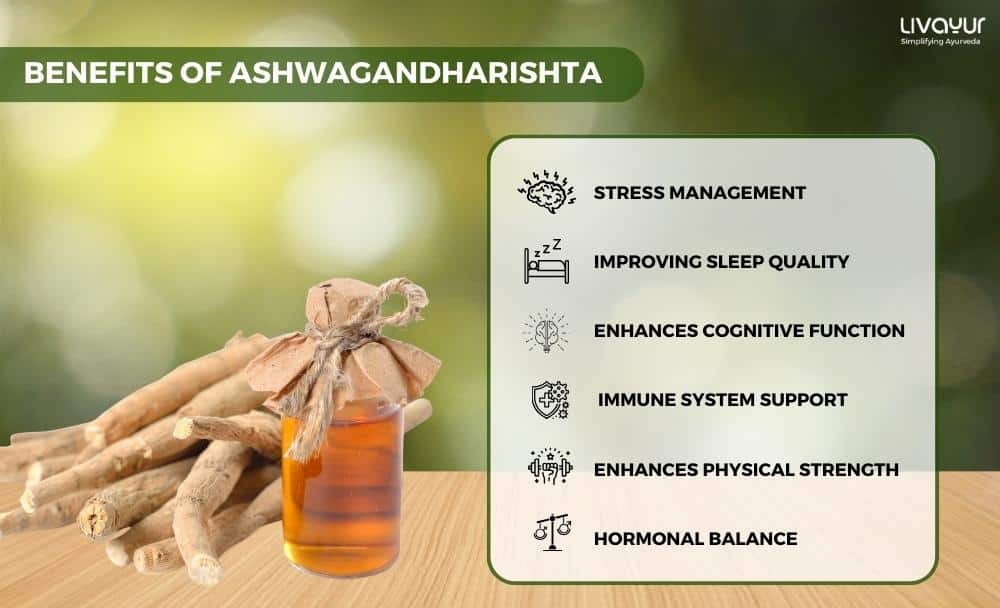
Are you aware of Ashwagandha, the most powerful adaptogenic herb from the repository of Ayurveda?
This Rasayana herb has been used for centuries to cure several human ailments. Many Ayurvedic medications have Ashwagandha as one of their chief ingredients. One such Ayurvedic syrup is Ashwagandharishta.
This Ayurvedic preparation has gained much popularity for its potential Ashwagandharishta syrup benefits for health.
The ancient formulation is rich in the rejuvenating herb Ashwagandha. also known by the names of Indian Ginseng and Indian Winter Cherry.
In this article, we will explore the Ashwagandharishta uses, Ashwagandharishta benefits, dosage recommendations, and potential Ashwagandharishta side effects.
Ashwagandharishta: An Overview
Ashwagandharishta is a traditional Ayurvedic formulation known as an “arishta” or “arishtam.” These are herbal and medicinal concoctions that undergo a natural fermentation process. The primary ingredient in Ashwagandharishta is Ashwagandha, scientifically known as Withania Somnifera, a revered adaptogenic herb in Ayurveda. [1], [2]
Did you know?
Ashwagandha is known as the ‘king of adaptogens, because of its ability to support a healthy stress response, restful sleep, and a positive mindset.
Ashwagandharishta Ingredients

| Sanskrit Name | Scientific name |
| Ashwagandha | Withania Somnifera |
| Haritaki | Terminalia chebula |
| Kali Musali | Curculigo Orchioides |
| Manjistha | Rubia cordifolia |
| Haridra | Curcuma longa |
| Yastimadhu | Glycyrrhiza Glabra |
| Nagkesara | Mesua ferrea |
| Elaichi | Eletteria cardamomum |
| Svet Chandana | Santalum album |
| Rakta Chandana | Pterocarpus santalinus |
| Tejpatra | Cinnamomum tamala |
| Tvak | Cinnamomum Zeyleynicum |
| Priyangu | Callicarpa microphylla |
| Svet Sariva | Hemidesmus indicus |
| Krisna Sariva | Ichnocarpus Frutescens |
| Mustaka | Cyperus rotundus |
| Pippali | Piper Longum |
| Marica | Piper Nigrum |
| Trivit | Ipomoea turpethum |
| Dhataki | Woodfordia floribunda |
| Arjuna | Terminalia arjuna |
| Chitraka | Plumbago Zeyleynica |
| Vacha | Acorus calamus |
| Vidari | Pueraria tuberosa |
| Daruharidra | Berberis aristata |
| Rasna | Alpinia Chinensis |
| Sonth | Zingiber Officinalis |
| Madhu | Honey |
| Water | For decoction |
What are the Benefits of Ashwagandharishta Syrup
1. Stress and Anxiety Management
Ashwagandharishta is commonly used to alleviate stress and anxiety. It has adaptogenic properties that help the body adapt to stressors, reducing the production of stress hormones like cortisol. [2]
2. Improves Sleep Quality

Many individuals use Ashwagandharishta to address sleep disturbances and insomnia. Its calming effects on the nervous system can promote better sleep patterns. [2]
3. Enhances Cognitive Function
Some people turn to Ashwagandharishta to support cognitive function and memory. It may help improve mental clarity and concentration. [3]
4. Immune System Support
Ashwagandharishta is believed to boost the immune system, making the body more resilient to infections and illnesses. [4]
5. Helps Building Physical Strength and Stamina
Athletes and fitness enthusiasts can use Ashwagandharishta to enhance physical performance and endurance. Ashwagandha in Ashwagandharishta is known for aiding the building of strength and muscle mass. [5]
6. Hormonal Balance
In Ayurveda, Ashwagandharishta is often recommended for hormonal imbalances in both men and women. It may help regulate hormones and address issues like irregular menstruation and low testosterone levels. [6], [7]
Uses of Ashwagandharishta
This herbal decoction comes with a series of therapeutic uses. The key ingredient in this product is the herb Ashwagandha. Ashwagandha herb has been used for centuries to treat various human ailments.
In several formulations Ashwagandha is one of the key ingredients. Dashmularishta is one such product where Ashwagandha is used in combination with other herbs such as Draksha and Manjistha. Dashmularishta ke fayde is a prominent topic of interest among those who love to delve into the depths of Ayurveda.
In Ashwagandharishta, there are several other valuable ingredients apart from Ashwagandha. Therefore, Ashwagandharishta includes many other uses other than the ones mentioned above. Given below is the list of several uses of Ashwagandharishta:
- Used as a heart tonic
- Used as an analgesic
- Used as a sports supplement
- Used as a uterine tonic
- Uses as an antidepressant
- Used as an energy tonic
Ashwagandharishta Dosage
The appropriate dosage of Ashwagandharishta can vary depending on individual factors such as age, health condition, and the guidance of an Ayurvedic practitioner.
It’s essential to consult an Ayurvedic practitioner or healthcare provider before starting any herbal remedy to determine the right dosage for your specific needs.
Ashwagandharishta Syrup Side Effects
No known side effects have been reported on Ashwagandharishta in Ayurvedic and Medical literature. However, the main ingredient Ashwagandha may have some unwanted side effects on pregnant women and people with hyperthyroidism. [8]
Overdose of this Ayurvedic syrup may lead to some side effects for some people. Possible side effects of this Ayurvedic drug could be
- Stomach upset
- Vomiting
- Diarrhoea
It is recommended to consult a licensed Ayurvedic practitioner before including the tonic in your daily routine.
Ashwagandharishta Precautions
1. Pregnancy and Breastfeeding
There is a lack of sufficient scientific evidence to prove that this herbal syrup is safe for pregnant women and breastfeeding moms. Therefore, before using this formula, pregnant women and breastfeeding mothers should definitely consult an Ayurvedic expert.
2. Patients with high blood pressure
Patients with high blood pressure or hypertension should be careful about using this syrup, as the BP medications may interact with Ashwagandharishta to produce unwanted Ashwagandharishta side effects.
3. Patients of Diabetes Mellitus
This Ayurvedic syrup has jaggery in it. Therefore, Diabetes patients must use this syrup with caution as it might lead to blood sugar spikes.
4. Children
This syrup is recommended for adult usage, and therefore must be kept out of the reach of children.
Ashwagandharishta Price Chart
The chart below shows the prices of the product across the different online selling sites.
| Online Shop | Price |
| Apollo 247 | Rs 110/- for 450 ml |
| Ayush Pharmacy | Rs 351/- for 450 ml |
| 1 mg | Rs 199/- for 450 ml |
| Netmeds | Rs 220/- for 450 ml |
| Flipkart | Rs 205/- for 450 ml |
| Amazon | Rs 199/- for 450 ml |
| Ayushmedi | Rs 200/- for 450 ml |
FAQs
1. How long does it take to experience the benefits of Ashwagandharishta?
The time it takes to experience the benefits of Ashwagandharishta can vary from person to person. Some individuals may notice improvements in stress levels or sleep quality within a few weeks, while others may take longer. Consistency in usage and following the recommended dosage is essential for optimal results.
2. Can multivitamins be taken along with this drug?
To know the answer for this question, you must consult an Ayurvedic doctor.
3. Are there any dietary restrictions when taking Ashwagandharishta?
There are typically no specific dietary restrictions when taking Ashwagandharishta. However, it’s advisable to maintain a balanced and healthy diet to complement its benefits. Ayurvedic practitioners may provide dietary recommendations tailored to your specific health needs.
4. Which is the best time to take Ashwagandharishta?
One should take the syrup after meals.
1. Can the alcohol in Ashwagandharishta affect your liver adversely?
The alcohol in Ashwagandharishta is a self-generated alcohol. This alcohol is formed due to the fermentation of the herbs present in the syrup. This type of alcohol supports liver function instead of harming the liver. However, if someone is suffering from chronic liver disease, he or she must consult a doctor.
2. Is it safe to drive after taking Ashwagandharishta?
You are advised not to drive after taking this syrup, as it may cause drowsiness and sleepiness.
3. What is the difference between Ashwagandharishjta and Ashwagandha?
Ashwagandha is an Ayurvedic herb while Ashwagandharishta is an Ayurvedic preparation made by combining and fermenting various herbs, including Ashwagandha.
Conclusion
Ashwagandharishta is a time-tested Ayurvedic formulation with a wide range of potential benefits, from stress relief and improved sleep quality to enhanced cognitive function and hormonal balance.
However, it is essential to use this herbal remedy under the guidance of an Ayurvedic practitioner and to be aware of potential Ashwagandharishta side effects and interactions, particularly when taking other medications. When used correctly, Ashwagandharishta can be a valuable addition to a holistic approach to health and well-being.
Disclaimer
This article is written from a health and wellness perspective and is not medical advice. Kindly seek the help of a certified medical practitioner before initiating any treatment.
References
- Standardization of Ashwagandharishta formulation by TLC method
- Adaptogenic and Anxiolytic Effects of Ashwagandha Root Extract in Healthy Adults: A Double-blind, Randomized, Placebo-controlled Clinical Study
- Effects of Acute Ashwagandha Ingestion on Cognitive Function
- Immunomodulatory Effect of Withania somnifera (Ashwagandha) Extract—A Randomized, Double-Blind, Placebo Controlled Trial with an Open Label Extension on Healthy Participants
- Benefits of Ashwagandha supplementation on strength and endurance exercise: a narrative review
- An Ayurvedic perspective on premenstrual syndrome
- Effect of standardized root extract of ashwagandha (Withania somnifera) on well‐being and sexual performance in adult males: A randomized controlled trial
- Uses of Withania somnifera (Linn) Dunal (Ashwagandha) in Ayurveda and its Pharmacological Evidences












